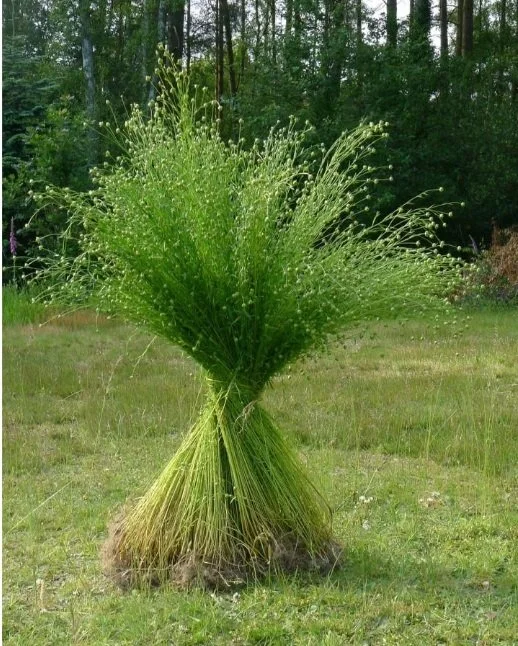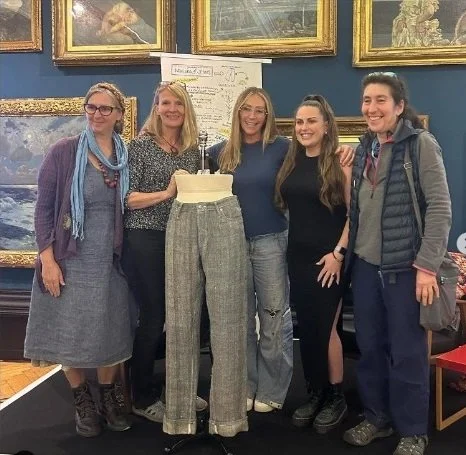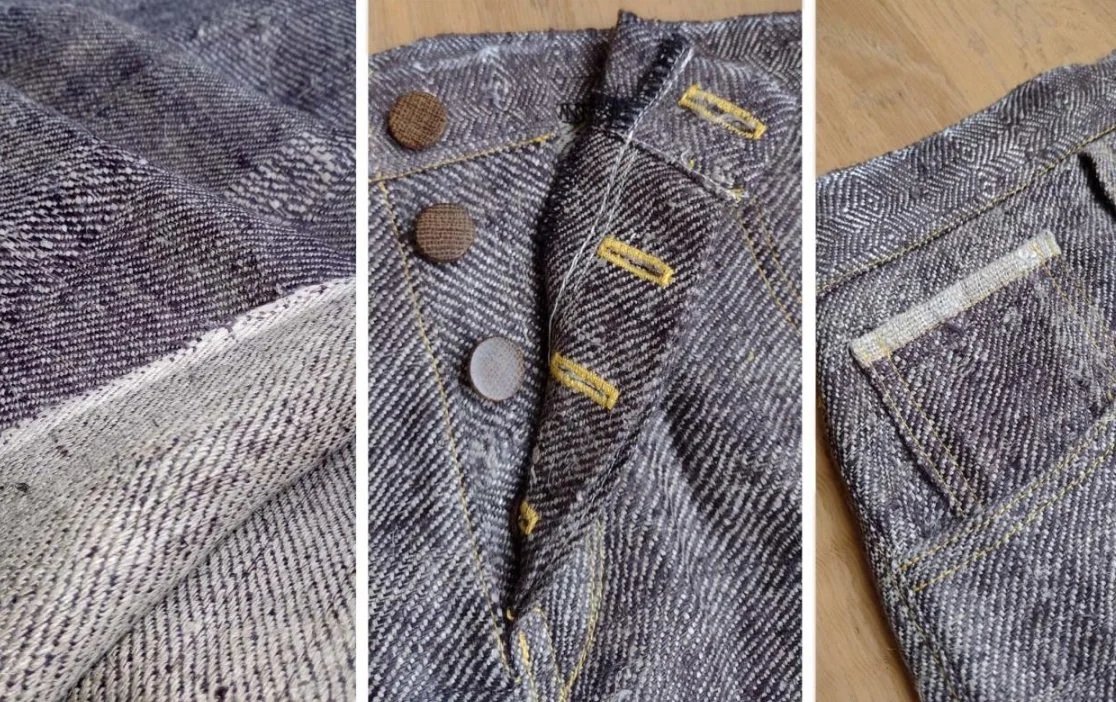Case Study - ‘Let’s Grow Flax’ Jeans Project
In this case study, Brigitte Kaltenbacher from Let’s Grow Flax explains how they communally grow and locally produce linen denim jeans in the Southeast of England:
These jeans were produced with the Fibreshed ethos in mind: locally grown, processed, spun, woven and sewn within 50 miles of the project centre, Farnham, Surrey. The journey of these jeans, from garden to garment, shows what’s possible when communities come together to rethink fashion.
The fibre was communally grown by the community group of ‘Lets Grow Flax’ in 2023. Members grew one to two square meters of flax in their garden. Allotments, and even flowerpots. The yarn was dyed with locally foraged plants like oak galls and waste material (onion skins), and woven by sustainable weaver Brigitte from BeeKayMakes in Hampshire. The jeans were sewn in London by Fibreshed member Nick Evans and exhibited at the ‘Fashion on Earth’ event in Bristol, organised by the Sustainable Fashion Week team. The jeans have also been featured on BBC Radio Surrey in December 2024. In March 2025, they will be part of the ‘Threads of Nature exhibition’ in Farnham Museum, Surrey.”
How it all began
In 2016, Rebecca Bures, founder of the Fibershed movement US, invited people to "Grow Your Jeans". The motivation derived from her 150 mile radius project. Rebecca learnt that the most missed item was jeans. This is no surprise, as jeans are both, utilitarian workhorse and one of the most iconic fashion staples in wardrobes worldwide. 70 million pairs were sold annually in the UK and over 4.5 billion pairs worldwide last year. However, conventional jeans come with a dire environmental cost; their production involves toxic dyes, excessive water use, and harmful chemicals. Therefore the initial ‘Grow your own Jeans’ Fibreshed project in the US was sourced from local fibres and dye materials like cotton, and indigo, following the Fibreshed ethos of local materials, local production and local labour. In 2021, the idea was brought to the UK by Fibreshed Northern England, backed by fashion designer and Great British Sewing Bee judge Patrick Grant and arts commissioning organisation The Super Slow Way who run the British Textile Biennial in Blackburn.
Brigitte was also supported the follow-up project “WomanGrowsJeans” in 2023, by Justine Aldersey-Williams of Fibreshed Northern England, with her expertise in weaving hand-spun linen yarn from local flax. It was a fantastic opportunity and brilliant experience for her to be part of a project that made fashion history with a niché team of highly skilled textile practitioners. The first indigo linen jeans to have been homegrown, processed, hand spun, naturally dyed, woven and sewn in the U.K. in over 120 years by one determined artisan. Being involved in these projects inspired Brigitte to extend the ‘Grow your own Jeans’ movement to the South-East of England, and flax enthusiasts along the Hampshire / Surrey Border, and also open the idea up to the local community.
Some adaptations were needed to adjust to local materials being used: a local alternative to cotton is linen, which is gained from the flax plant. Flax is a plant with a rich heritage in this country; in addition, it is a perfect fibre plant for regenerative farming and agriculture cultivation.
Brigitte from BeeKayMakes, a sustainable weaver and long-standing flax fan, wove the development samples for this project to understand how a cotton denim would translate into a linen denim. Four samples later, the spec was approved by Patrick Grant, and woven into the final piece of cloth that was exhibited at the British Textile Biennial 2021.
Let’s Grow Flax, A Communal Grass Root Initiative
In 2023, Brigitte initiated ‘Lets Grow Flax’. With the support of fellow artisan and natural dyer Ginny Farquhar, Brigitte guided the group of 30 locals through the entire flax crop cycle. Each member grew one or two square meter of flax in their gardens, allotments, and even flowerpots within 50 miles of Farnham, Surrey. Members were tutored in all skills to grow their own cloth: from planting and harvesting flax to processing and spinning flax fibre into linen yarn. All growers kept a third of their crop to learn traditional textiles skills, the rest was donated to the jeans project.
In 2024, Brigitte collaborated with the Fantasy Fibre Mill, a pioneering micro-mill using open-source machinery to enable small-scale, bio-regional production of natural fibre yarn. Their innovate work offers artisans and (flax growing) communities a way into local textile production. In their own words:
“Fantasy Fibre Mill connects regenerative agriculture to ethical fashion. Our open source machinery enables the bio-regional production of natural fibre yarn. We aim to disrupt the extractive and exploitative fashion supply chain and instead produce textiles which nurture the local environment and community. Together with our collaborators across the country, we are building a soil-to-soil textile economy in the UK.”
Linen Jeans – The Making Of
The mill spun part of the flax fibre into linen yarn for the warp. Brigitte hand-spun the weft yarn and dyed it with oak galls and iron water. This powerful combination of natural dye materials creates a rich black that has been used and lasts for centuries. Both, the book of Kells (~800AD) and the Magna Carta (1215 AD) were written with oak gall ink and are still clear and dark today!
The yarn was woven into a traditional denim cloth using the typical twill construction, and sewn into jeans by Fibreshed member Nick Evans of @FirstPrincipals, a passionate linen and denim lover and sustainable fashion activist. Every detail of the jeans was carefully considered to align with the project’s sustainable ethos:
• Genderless cut and relaxed-fitting: A versatile style to accommodates various body types and sizes.
• Fully biodegradable: Locally made oak wood buttons and additional darts replaced metal zippers and rivets.
• Eco-friendly sewing: the GOTS certified ‘Tencel’ thread was naturally dyed with onion skins
• Efficient patterns: Cutting waste was minimized with a smart lay pattern.
More Than Just Jeans
The significance of these jeans goes beyond the details of sustainable production; they represent powerful connections on multiple levels.
They reconnect us to a rich textile history of UK linen production, a practice that thrived for centuries, as well as a sustainable future: flax is a low-impact crop that requires no irrigation, minimal fertilisers, and regenerates our rapidly disappearing precious soil. Its deep roots balance our soil, improve its structure, and sequester carbon.
Besides collaborating with the Fantasy Fibre Mill, the group connected to maker-spaces and local wood working groups to have tools made; friends and families helped or started flax growing themselves, and skills and resources were pooled. We benefited from the professional flax expertise by ‘Flaxland UK’, member of South West Fibreshed England, research support by ‘Denim Research’ and expert flax spinning tuition by WSD Guild tutor ‘MandaCrafts’.
Public engagement also was a key element of the project. Demonstrations at venues like Farnham Museum and the Weald & Downland Living Museum (home of The Repair Shop) allowed the group to share their skills and the progress of the jeans. And we were beyond proud to exhibit our jeans at the ‘Fashion of Earth’ event in Bristol, organised by ‘Sustainable Fashion Week’.
Let’s Grow Flax’s Vision:
Our linen denim jeans go beyond creating a sustainable garment - they embody a radically new way to approach fashion and clothing production. Inspired by Fibreshed’s ‘soil to soil’ ethos, they demonstrate the potential for a circular, regenerative textile system that uses local materials, local labour, and local networks. These jeans are an example of an environmentally conscious, bio-regional and regenerative textile practice, and the power of communities to drive a positive textile future.”
Lets Grow Flax will continue to guide flax fans through the processes of growing and processing their own flax, as well as collaborating with the Fantasy Fibre Mill in order to establish regional textile networks of growers, textile artisans and local flax micro mills.
If you’d like to learn more about their initiative, email LetsGrowFlax@gmail.com or visit www.letsgrowflax.org.uk.






